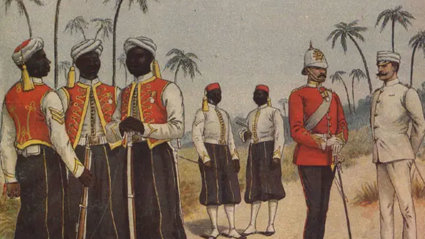
Colonial science and military service
The West India Regiments and circum-Atlantic networks of knowledge, c.1815-1900.
Research by Catriona Sharples.
Start: September 2021. University of Warwick: PI Professor David Lambert and Dr James Poskett.
Overview
This PhD project focuses on the role of the West India Regiments (WIR) in projects of circum-Atlantic colonial science, particularly exploration, botany and ethnology, in the nineteenth-century British Empire. Based at the University of Warwick in partnership with the Society and the Royal Botanic Gardens, Kew, the project sits at the interface of histories of science, empire and the military.
The project also seeks to contribute to the ‘decolonisation’ of scholarly collections and academic knowledge. This is because the WIRs occupy a unique place in the history of British Empire in that they were a regular part of the British army but were almost entirely comprised of men of African descent.
The WIRs were first established in the 1790s and served across the Caribbean and later West Africa. Across and within these regions, their personnel participated in the collection, exchange, circulation and publication of colonial knowledge. Some of these practices were directly related to Britain’s military needs, while others were pursued privately in correspondence with metropolitan learned societies and organisations such as the Royal Botanic Gardens and the Society.
Ordinary soldiers too participated in the ‘hidden histories’ of circum-Atlantic colonial science. The project will draw extensively on the collections of both the Society and the Royal Botanic Gardens, as well as others including the National Army Museum and The National Archives, plus archives in Jamaica and Barbados, which were the principal headquarters of the 1st and 2nd West India Regiments respectively.